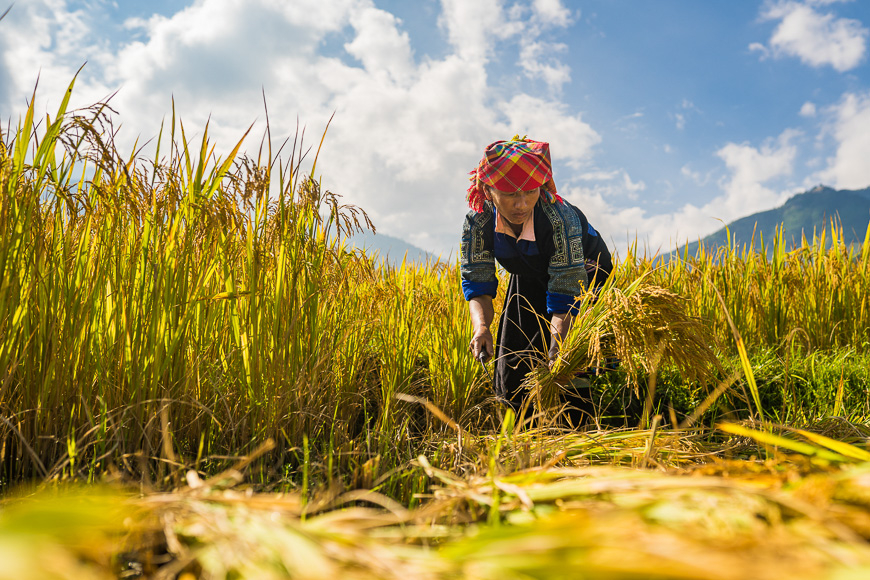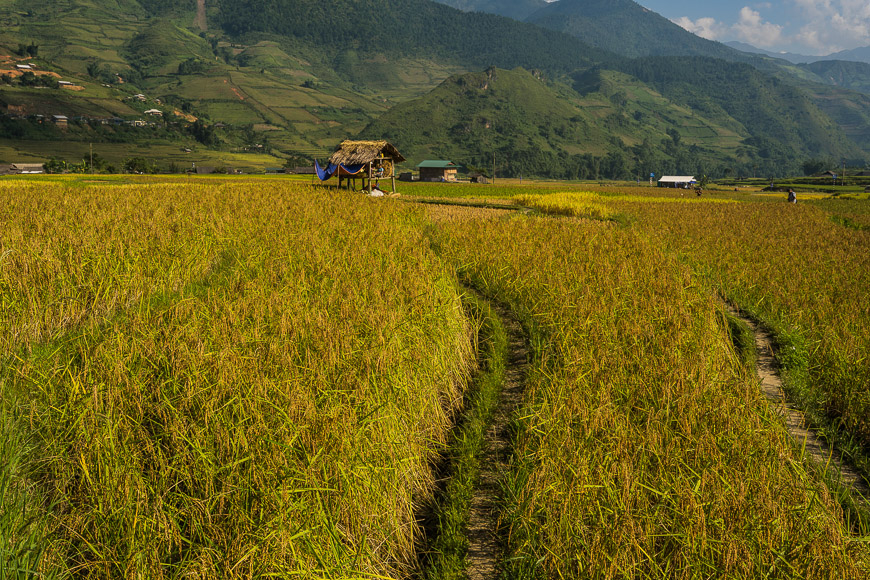Mu Cang Chai is home to some of Asia’s most magnificent cultivated topography. Rice terraces coil in ribbons around the hills to spectacular effect, luring photographers, hikers, and avid motorbikers. Ready for an adventure? Whatever you’re looking for, here are four things you’ll simply love about Mu Cang Chai.
Spectacular rice terraces
Mu Cang Chai’s sheer rice terraces were sculpted over centuries of small-scale cultivation. Each season brings its own charm.
During the summer, the terraces bulge with ripening rice stems that blanket the hills in a vibrant green. By early autumn, the rice plants have turned a bewitching golden yellow, ready for the harvest. In wintertime, the lonely terraces fill with water, creating cascading rows of reflective infinity pools. Once spring comes, the terraces transform into anthills of activity, as the farmers plant a new crop.
TIP: The unmissable terraces around Mam Xoi have become synonymous with Mu Cang Chai, although virtually every bend of the road offers picture-perfect scenery. Make sure you have your camera ready, as each vista will seem better than the last.
Vibrant Hmong culture

Mu Cang Chai is mainly populated by the Black Hmong, a subgroup of one of Vietnam’s largest ethnicities. Pretty Hmong villages are dotted around the district. Each one offers a glimpse into a rich culture.
Unlike many other minority groups in Vietnam, the Hmong don’t live in raised houses on wooden stilts. Instead, they build their homes on flattened earth. Hmong textile culture is highly developed, and you’ll find that many villagers – both men and women – still wear the traditional dress. Black Hmong men typically wear dark tunics and hats, while women wear longer tunics with arms and waistbands in bright colours.
TIP: For culture lovers, some Black Hmong villages worth seeking out are Mo De, Le Pan Tan, Sang Nhu, and Mang Mu.
Excellent motorbiking
Mu Cang Chai is one of the best places in Vietnam to take on the roads. You’ll find quality strips of tarmac that weave around oval hills and sky-high dirt tracks that cling to near-vertical cliff faces. Whether you want a gentle ride following trickling rivers or an adrenaline-filled dirt bike experience, Mu Cang Chai provides the stage.
Notable main roads include the magnificent stretch between Mu Cang Chai town and Tu Le via the Khau Pha mountain pass. For a gentle ride through ethnic Thai villages, continue to Nghia Lo before circling back. Off the main road, a ride up to Mo De village offers more great views on a mostly paved road.
TIP: In this remote part of Vietnam, the main roads are quiet, and the smaller roads are empty. It’s easy to plan your own routes with Google Maps. You can arrange basic motorcycles from your hotel in Mu Cang Chai, or rent dirt bikes from tour operators in Hanoi.
Undiscovered hiking trails

Hiking is a great way to absorb Mu Cang Chai’s scenery at a slower pace. You’ll pass layers of rice terraces, tea and corn plantations, and higher up, primary tropical rainforest.
Hiking may be a new tourist activity in Mu Cang Chai, but the Hmong have been roaming these hills for centuries. Until recently, villagers travelled almost everywhere by foot, creating a network of trails that zigzag up the valleys and into the mountains. These trails connect every hamlet and provide excellent hiking routes for long and short forays.
Tips for travellers to Mu Cang Chai

Transport to Mu Cang Chai
Mu Cang Chai is a six- to eight-hour road journey from Hanoi. You can arrange a direct bus or private car through your hotel. Alternatively, you can hop on public buses or the train to Yen Bai (three to four hours) and then find onward transport to Mu Cang Chai via Nghia Lo.
Accommodation in Mu Cang Chai
There are clean and basic hotels and restaurants in Mu Cang Chai town. Homestays sprinkled around nearby villages trade in warm hospitality and hearty home cooking. About 30km from the town, Mu Cang Chai Ecolodge offers boutique bungalows and comfortable dorm beds.
Tours in Mu Cang Chai
You’re best off hiking with a local guide that can show you the most appealing routes. Mr. Dung, the owner of Mu Cang Chai Ecolodge, tailors private tours for his guests. For a longer route, Diethelm Travel offers a an all-inclusive four-day hike, available online.






